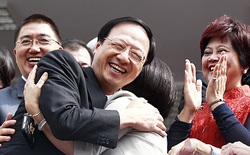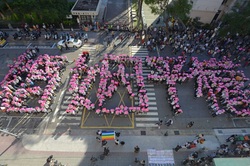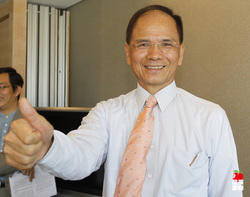

Taiwan has a reputation as being fairly tolerant towards homosexuality, contrasting favorably with Japan, South Korea, the Philippines, Hong Kong, and especially mainland China, and if the bill passes, it would make Taiwan the first country in Asia to legalize same-sex marriage. So the sizable turnout for the anti-gay-marriage protest has attracted a lot of international coverage, including pieces in the Economist and AFP, as well as U.S.-based advocates on both sides of the issue. Perhaps less well-known is that Taiwan has a significant Christian community, estimated at between 4-5% of the population, that has played a disproportionately large role in Taiwan's post-war political history. Christian evangelical churches, a newer phenomenon in Taiwan, played a central role in organizing the counter-demonstration, as this blog post details.

The battle over nominations is also uncovering old factional fault lines within the DPP. Especially striking is the success of the New Tide faction (新潮流派系)--the nominees for Pingtung, Changhua, Nantou, and Yunlin Counties all have ties to the faction, and another New Tide member, Tsai Chi-chang (蔡其昌), is battling for the nomination in Taichung City.
The DPP's nomination for Taipei City has yet to be decided, but Wellington Koo (顧立雄) is drawing endorsements from many New Tide members as well. He's going up against another "old face" in the DPP: former vice president Annette Lu (呂秀蓮). The best candidate the DPP could run, according to polls, is National Taiwan University physician Ko Wen-je (柯文哲). There's only one problem: Ko is not a party member, wants to remain independent, and recently called the DPP "chaotic and dangerous", while at the same time looking increasingly likely to run. If the DPP can't persuade Ko to join the party, it will face an unpalatable choice between running a spoiler candidate and not running one at all. The fight over the Taipei nomination has signs of being a proxy battle for the 2016 presidential nomination: current DPP chairman Su Tseng-chang (蘇貞昌 ) appears to favor Koo, while 2012 nominee Tsai Ing-wen (蔡英文) has been linked to Ko.
On the KMT side, Sean Lien (連勝文) is still polling better than anyone else and looks to have the inside track on the nomination if he wants it. His stiffest potential challenge would probably be from current New Taipei City mayor Eric Chu (朱立倫), who might be interested in switching seats to improve his presidential prospects.


 RSS Feed
RSS Feed
